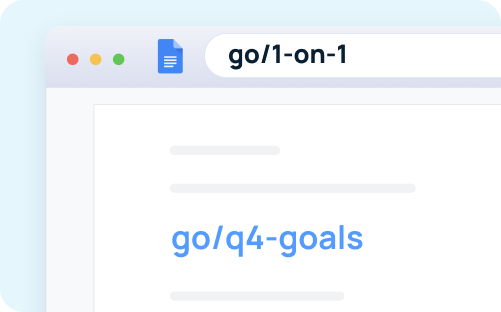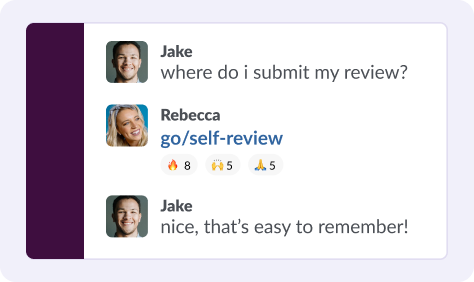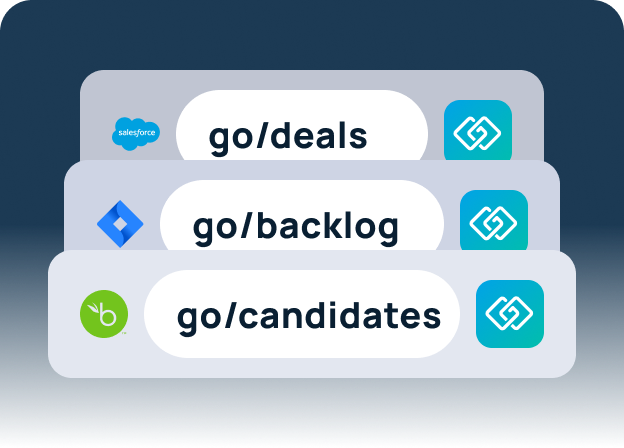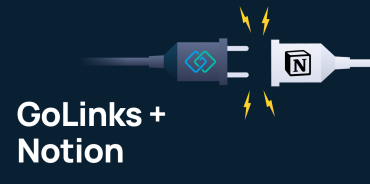With any new app, adoption doesn’t happen automatically. Even with the best tools, teams need guidance, modeling, and consistent examples from leadership to truly embrace them. For GoLinks, one of the biggest differences between a handful of employees using it and full company-wide adoption is manager and leadership buy-in.
When managers and team leads consistently use go links, they set a powerful example. They show their teams how easy it can be to share resources, align on goals, and eliminate link chaos. If you’re a people manager, this guide will help you champion GoLinks adoption with practical, proven ways to incorporate it into your daily workflows.
1. Model GoLinks Adoption: Lead by Example
The most effective way to drive GoLinks adoption is to use them consistently yourself.
Drop go links in Slack. Reference them in meetings. Add them to documentation. The more visible your usage, the more normalized it becomes.
Leaders who lead with GoLinks show their teams that this isn’t just another productivity tool—it’s an integral part of how your company operates.
Why this matters:
When leadership teams embrace GoLinks best practices, adoption scales naturally across the organization. GoLinks becomes more than a time-saver—it becomes the foundation for how your company shares knowledge, communicates, and collaborates.
2. Add Go Links to Your Onboarding and Training
Make GoLinks part of every new hire’s experience. Include your team’s most important go links in onboarding docs, welcome messages, or training sessions so new employees immediately know where to find resources.
Examples:
go/onboarding→ onboarding guidego/benefits→ company benefits electiongo/handbook→ documentation hub
When new hires see go links embedded in their workflow from day one, they quickly understand that this is how your team works.
💡 Pro tip: Create a dedicated go/newhire or go/welcome link that bundles all essential onboarding resources in one place. It’s an easy win that helps new employees ramp up faster.

3. Follow GoLinks Best Practices for Lasting Adoption
Go links are most effective when used consistently and intentionally across your team’s workflows. By setting a few clear best practices, managers can help everyone use GoLinks in a way that keeps knowledge organized, accessible, and up to date.
Best practices to share with your team:
- Use clear, memorable names like
go/onboardingorgo/roadmap - Keep links evergreen—update destinations instead of creating duplicates
- Create shared folders or naming conventions for teams (e.g.,
go/marketing,go/engineering) - Embed go links in templates, wikis, and recurring docs
- Review and refresh outdated go links each quarter
Why this matters:
- Promotes consistency across the organization
- Keeps your knowledge base clean and discoverable
- Prevents confusion from broken or duplicate links
- Makes GoLinks a reliable foundation for everyday workflows
When go links are managed intentionally, they become more than shortcuts—they become a shared system of knowledge everyone can trust.
4. Use Go Links in 1:1s to Streamline Conversations
Your recurring 1:1s are the perfect place to model GoLinks usage. Instead of wasting time searching for shared docs, dashboards, or feedback forms, create go links to keep everything just a few keystrokes away.
Examples:
go/1on1→ shared doc for meeting notesgo/skip-levels→ skip level meeting takeawaysgo/feedback→ team or company feedback framework
💡 Pro tip: Add your recurring 1:1 go link directly in the calendar invite or meeting doc template. It ensures consistency and makes it easy for both people to prepare before every conversation.

5. Use Go Links to Share KPIs and Team Metrics
As a leader, you’re responsible for aligning your team around clear goals. Go links make it effortless to share key dashboards and performance indicators without confusion or outdated links.
Examples:
go/closed-won→ dashboard to track quota attainmentgo/product-kpis→ Notion or Miro page with current goalsgo/team-okrs→ shared OKR tracker
Why this matters:
- Creates a single source of truth for goals
- Makes performance visibility consistent and transparent
- Eliminates duplicate or outdated URLs
When everyone knows exactly where to find KPIs, it builds accountability and trust across the team.
6. Use Go Links in Performance and Goal Reviews
Performance reviews can be complex, with references scattered across documents, systems, and folders. Go links help simplify that process by consolidating everything in one place.
Examples:
go/reviews→ official review form or portalgo/career→ career framework or leveling guidego/self-review→ employee self-evaluation form
Encourage employees to create personal go links for their development plans or feedback docs. It makes it easier to prepare for review discussions and track progress over time.
💡 Pro tip: Before review season begins, send a quick reminder in Slack or email with your team’s key review go links. It’ll save time, prevent confusion, and set clear expectations for the process.

7. Incorporate Go Links in Standups and Team Meetings
Standups and weekly syncs are natural opportunities to reinforce GoLinks usage. Reference go links out loud and share them in meeting invites or agendas so your team sees how seamless they can be.
Examples:
go/standup→ daily notes or templatego/sprint→ Jira or Linear sprint dashboardgo/bug-tracker→ list of current issues
💡 Pro tip: Include recurring go links in your calendar invite or pinned Slack message. This reduces friction and reinforces consistent access.
Start small: pick a few go links that make your team’s life easier and use them consistently. Over time, that consistency will turn into culture.
Because when everyone uses GoLinks, everyone moves faster.
Access and share resources instantly with GoLinks
Schedule a demo














